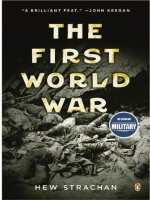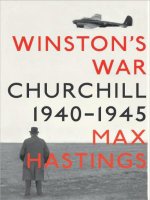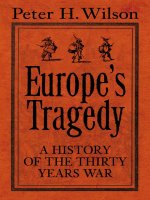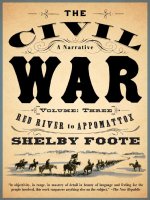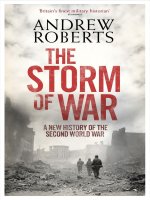Max hastings winstons war churchill, 1940 945 (v5 0)
Bạn đang xem bản rút gọn của tài liệu. Xem và tải ngay bản đầy đủ của tài liệu tại đây (8.92 MB, 520 trang )
ALSO BY MAX HASTINGS
REPORTAGE
America 1968: The Fire This Time
Ulster 1969: The Struggle for Civil Rights in Northern Ireland
The Battle for the Falklands (with Simon Jenkins)
BIOGRAPHY
Montrose: The King’s Champion
Yoni: Hero of Entebbe
AUTOBIOGRAPHY
Going to the Wars
Editor
MILITARY HISTORY
Bomber Command
The Battle of Britain (with Len Deighton)
Das Reich
Overlord
Victory in Europe
The Korean War
Warriors: Extraordinary Tales from the Battlefield
Armageddon: The Battle for Germany, 1944–1945
Retribution: The Battle for Japan, 1944–45
COUNTRYSIDE WRITING
Outside Days
Scattered Shots
Country Fair
ANTHOLOGY
(Edited)
The Oxford Book of Military Anecdotes
In memory of Roy Jenkins,
and our Indian summer friendship
It may well be that the most glorious chapters of our history have yet to be
written. Indeed, the very problems and dangers that encompass us and our
country ought to make English men and women of this generation glad to be here
at such a time. We ought to rejoice at the responsibilities with which destiny has
honoured us, and be proud that we are guardians of our country in an age when
her life is at stake.
—Winston Spencer Churchill, April 1933
History with its ickering lamp stumbles along the trail of the past, trying to
reconstruct its scenes, to revive its echoes, and kindle with pale gleams the
passion of former days.
—Winston Spencer Churchill, November 1940
Contents
List of Maps
Introduction
1. The Battle of France
2. The Two Dunkirks
3. Invasion Fever
4. The Battle of Britain
5. Greek Fire
Insert 1
6. Comrades
7. The Battle of America
8. A Glimpse of Arcadia
9. “The Valley of Humiliation”
Insert 2
10. “Second Front Now!”
11. Camels and the Bear
12. The Turn of Fortune
13. Out of the Desert
14. Sunk in the Aegean
Insert 3
15. Tehran
16. Setting Europe Ablaze
17. Overlord
18. Bargaining with an Empty Wallet
19. Athens: “Wounded in the House of Our Friends”
Insert 4
20. Yalta
21. The Final Act
Acknowledgements and References
Notes
Select Bibliography
Illustration Credits
Maps
Europe
The Mediterranean
May 1940 Deployments
The German Advance
The Dunkirk Perimeter
Operation Sealion
Operation Compass
The North African Campaign
Operation Torch
The Italian Campaign
The Dodecanese
Overlord and Anvil
Introduction
CHURCHILL was the greatest Englishman and one of the greatest human beings of the
twentieth century, indeed of all time. Yet, beyond that bald assertion, there are in nite
nuances in considering his conduct of Britain’s war between 1940 and 1945, which is the
theme of this book. It originated nine years ago, when Roy Jenkins was writing his
biography of Churchill. Roy attered me by inviting my comments on the typescript,
chapter by chapter. Some of my suggestions he accepted; many he sensibly ignored.
When we reached the Second World War, his patience expired. Exasperated by the
profusion of my strictures, he said: “You’re trying to get me to do something which you
should write yourself, if you want to!” By that time, his health was failing. He was
impatient to finish his own book, which achieved triumphant success before his death.
In the years which followed, I thought much about Churchill and the war, mindful of
some Boswellian lines about Samuel Johnson: “He had once conceived1 the thought of
writing The Life Of Oliver Cromwell … He at length laid aside his scheme, on
discovering that all that can be told of him is already in print; and that it is
impracticable to procure any authentick information in addition to what the world is
already possessed of.” Among the vast Churchillian bibliography, I was especially
apprehensive about venturing anywhere near the tracks of David Reynolds’s
extraordinarily original and penetrating 2005 In Command of History. The author
dissected successive drafts of Churchill’s war memoirs, exposing contrasts between
judgements on people and events which the old statesman initially proposed to make,
and those which he nally deemed it prudent to publish. Andrew Roberts has painted2 a
striking portrait of wartime Anglo-American relations in his 2009 Masters and
Commanders. We have been told more about Winston Churchill than any other human
being. Tens of thousands of people of many nations have recorded even tri ing
encounters, noting every word which they heard him utter. The most vivid wartime
memory3 of one soldier of Britain’s Eighth Army derived from a day in 1942 when he
found the prime minister his neighbour in a North African desert latrine. Churchill’s
speeches and writings fill many volumes.
Yet much remains opaque, because he wished it thus. Always mindful of his role as a
stellar performer upon the stage of history, he became supremely so after May 10, 1940.
He kept no diary because, he observed, to do so would be to expose his follies and
inconsistencies to posterity. Within months of his ascent to the premiership, however, he
told his sta 4 that he had already schemed the chapters of the book which he would
write as soon as the war was over. The outcome was a ruthlessly partial six-volume
work which is poor history, if sometimes peerless prose. We shall never know with
complete con dence what he thought about many personalities—for instance Roosevelt,
Eisenhower, Brooke, King George VI, his Cabinet colleagues—because he took good care
not to tell us.
Churchill’s wartime relationship with the British people was much more complex than
is often acknowledged. Few denied his claims upon the premiership. But between the
end of the Battle of Britain in 1940 and El Alamein in November 1942, not only many
ordinary citizens, but also some of his closest colleagues wanted operational control of
the war machine to be removed from his hands, and some other gure appointed to his
role as minister of defence. It is hard to overstate the embarrassment and even shame of
the British people, as they perceived the Russians playing a heroic part in the struggle
against Nazism, while their own army seemed incapable of winning a battle. To
understand Britain’s wartime experience, it appears essential to recognise, as some
narratives do not, the sense of humiliation which a icted Britain amid the failures of its
soldiers, contrasted—albeit often on the basis of wildly false information—with the
achievements of Stalin.
Churchill was dismayed by the performance of the British Army, even after victories
began to come at the end of 1942. Himself a hero, he expected others likewise to show
themselves heroes. In 1940, the people of Britain, together with their navy and air force,
wonderfully ful lled his hopes. Thereafter, however, much of the story of Britain’s part
in the war seems to me that of the prime minister seeking more from his nation’s
warriors than they could deliver. The failure of the army to match the prime minister’s
aspirations is among the central themes of this book.
Much discussion of Britain’s military e ort in World War II focuses upon Churchill’s
relationship with his generals. In my view, this preoccupation is overdone. The
di culties of ghting the Germans and Japanese went much deeper than could be
solved by changes of commanders. The British were beaten again and again between
1940 and 1942, and continued to su er battle eld di culties thereafter, in consequence
of failures of tactics, weapons, equipment and culture even more signi cant than lack of
mass or inspired leadership. The gulf between Churchillian aspiration and reality
extended to the peoples of occupied Europe, hence his faith in “setting Europe ablaze”
through the agency of Special Operations Executive, which had malign consequences
that he failed to anticipate. SOE armed some occupied peoples to ght more
energetically against one another in 1944–45 than they had done earlier against the
Germans.
It is a common mistake to suppose that those who bestrode the stage during
momentous times were giants, set apart from the personalities of our own humdrum
society. I have argued in earlier books that we should instead see 1939–45 as a period
when men and women not much di erent from ourselves strove to grapple with stresses
and responsibilities which stretched their powers to the limit. Churchill was one of a tiny
number of actors who proved worthy of the role in which destiny cast him. Those who
worked for the prime minister, indeed the British people at war, served as a supporting
cast, seeking honourably but sometimes inadequately to play their own parts in the
wake of a titan.
Sir Edward Bridges, then cabinet secretary, wrote of Churchill between 1940 and
1942: “Everything depended upon him5 and him alone. Only he had the power to make
the nation believe that it could win.” This remains the view of most of the world, almost
seventy years later. Yet there is also no shortage of iconoclasts. In a recent biography
Cambridge lecturer Nigel Knight writes contemptuously of Churchill: “He was not mad6
or simple; his misguided decisions were a product of his personality—a mixture of
arrogance, emotion, self-indulgence, stubbornness and a blind faith in his own ability.”
Another modern biographer, Chris Wrigley, suggests that Sir Edward Bridges’s tribute to
Churchill “may overstate his indispensability.”7
Such strictures seem otiose to those of us convinced that, in his absence, Britain would
have made terms with Hitler after Dunkirk. Thereafter, beyond his domestic
achievement as war leader, he performed a diplomatic role of which only he was
capable: as suitor of the United States on behalf of the British nation. To ful l this, he
was obliged to overcome intense prejudices on both sides of the Atlantic. So extravagant
was Churchill’s—and Roosevelt’s—wartime rhetoric about the Anglo-American alliance
that even today the extent of mutual suspicion and indeed dislike between the two
peoples is often underestimated. The British ruling class, in particular, condescended
amazingly towards Americans.
In 1940–41, Winston Churchill perceived, with a clarity which eluded some of his
fellow countrymen, that only American belligerence might open a path to victory. Pearl
Harbor, and not the prime minister’s powers of seduction, eventually brought
Roosevelt’s nation into the war. But no other statesman could have conducted British
policy towards the United States with such consummate skill, nor have achieved such
personal in uence upon the American people. This persisted until 1944, when his
standing in the United States declined precipitously, to revive only when the onset of
the Cold War caused many Americans to hail Churchill as a prophet. His greatness,
which had come to seem too large for his own impoverished country, then became
perceived as a shared Anglo-American treasure.
From June 1941 onwards, Churchill saw much more clearly than most British soldiers
and politicians that Russia must be embraced as an ally. But it seems important to strip
away legends about aid to the Soviet Union, and acknowledge how small this was in the
decisive 1941–42 period. Stalin’s nation saved itself with little help from the Western
Allies. Only from mid-1943 onwards did supplies to Russia gain critical mass, and AngloAmerican ground operations absorb a significant part of the Wehrmacht’s attention.
The huge popularity of the Soviet Union in wartime Britain was a source of dismay,
indeed exasperation, to the small number of people at the top who knew the truth about
the barbarity of Stalin’s regime, its implacable hostility to the West and its imperialistic
designs on eastern Europe. The divide between the sentiments of the public and those of
the prime minister towards the Soviet Union became a chasm in May 1945. One of
Churchill’s most astonishing acts, in the last weeks of his premiership, was to order the
Joint Planning Sta to produce a draft for Operation Unthinkable. The resulting
document considered the practicability of launching an Anglo-American o ensive
against the Russians, with forty-seven divisions reinforced by the remains of Hitler’s
Wehrmacht, to restore the freedom of Poland. Though Churchill acknowledged this as a
remote contingency, it is remarkable that he caused the Chiefs of Sta to address it at
all.
I am surprised how few historians seem to notice that many things which the British
and Americans believed they were concealing from the Soviets—for instance, Bletchley
Park’s penetration of Axis ciphers and Anglo-American arguments about launching a
Second Front—were well-known to Stalin, through the good o ces of Communist
sympathisers and traitors in Whitehall and Washington. The Soviets knew vastly more
about their allies’ secret policy making than did the British and Americans about that of
the Russians.
It is fascinating to study public mood swings through wartime British, American and
Russian newspapers and the diaries of ordinary citizens. These often give a very
di erent picture from that of historians, with their privileged knowledge of how the
story ended. As for sentiment at the top, some men who were indi erent politicians or
commanders contributed much more as contemporary chroniclers. The diaries of such
gures as Hugh Dalton, Leo Amery and Lt. Gen. Henry Pownall make them more
valuable to us as eyewitnesses and eavesdroppers than they seemed to their
contemporaries as players in the drama.
Maj. Gen. John Kennedy, for much of the war the British Army’s director of military
operations, kept a diary which arguably ranks second only to that of Gen. Sir Alan
Brooke for its insights into the British military high command. On January 26, 1941, in
the darkest days of the con ict, Kennedy expressed a fear that selective use of accounts
of the meetings of Britain’s leaders might mislead posterity:
It would be easy by a cunning8 or biased selection of evidence to give the
impression for instance that the P.M.’s strategic policy was nearly always at fault,
& that it was only by terri c e orts that he is kept on the right lines—and it would
be easy to do likewise with all the chiefs of sta . The historian who has to deal with
the voluminous records of this war will have a frightful task. I suppose no war has
been so well documented. Yet the records do not often reveal individual views. It is
essentially a government of committees … Winston is of course the dominating
personality & he has in his entourage and among his immediate advisers no really
strong personality. Yet Winston’s views do not often prevail if they are contrary to
the general trend of opinion among the service sta s. Minutes utter continually
from Winston’s typewriter on every conceivable subject. His strategic imagination is
inexhaustible and many of his ideas are wild and unsound and impracticable … but
in the end they are killed if they are not acceptable.
These observations, made in the heat of events, deserve respect from every historian
of the period. Another banal and yet critical point is that circumstances and attitudes
shifted. The prime minister often changed his mind, and deserves more credit than he
sometimes receives for his willingness to do so. Meanwhile, others vacillated in their
views of him. Some who revered Churchill in the rst months of his premiership later
became bitterly sceptical, and vice versa. After Dunkirk, Britain’s middle classes were
considerably more staunch than some members of its traditional ruling caste, partly
because they knew less about the full horror of the country’s predicament. History
perceives as pivotal Britain’s survival through 1940, so that the weariness and cynicism
which pervaded the country by 1942, amid continuing defeats, are often underrated.
Industrial unrest, manifested through strikes especially in the coal elds and in the
aircraft and shipbuilding industries, revealed ssures in the fabric of national unity
which are surprisingly seldom acknowledged.
This book does not seek to retell the full story of Churchill at war, but rather to
present a portrait of his leadership from the day on which he became prime minister,
May 10, 1940, set in the context of Britain’s national experience. It is weighted towards
the rst half of the con ict, partly because Churchill’s contribution was then much
greater than it became later, and partly because I have sought to emphasise issues and
events about which there seem new things to be said.
I have written relatively little in this book about the strategic air o ensive, having
addressed this earlier in Bomber Command and Armageddon. I have here con ned myself
to discussion of the prime minister’s personal role in key bombing decisions. I have not
described land and naval campaigns in detail, but instead considered the institutional
cultures which in uenced the performance of the British Army, the Royal Navy and the
Royal Air Force (RAF), and the three services’ relationships with the prime minister.
To maintain coherence, it is necessary to address some themes and episodes which are
familiar, though specific aspects deserve reconsideration. There was, for instance, what I
have called the second Dunkirk, no less miraculous than the rst. Churchill’s biggest
misjudgement of 1940 was his decision to send more troops to France in June after the
rescue of the British Expeditionary Force (BEF) from the beaches. Only the stubborn
insistence of their commander, Lt. Gen. Sir Alan Brooke, made it possible to overcome
the rash impulses of the prime minister and evacuate almost 200,000 men who would
otherwise have been lost.
The narrative examines some subordinate issues and events in which the prime
minister’s role was crucial, such as the strategic contribution of SOE (as distinct from
romantic tales of its agents’ derring-do), the Dodecanese campaign and Churchill’s
Athens adventure in December 1944. I have attempted little original research in his own
papers. Instead, I have explored the impression he made upon others—generals,
soldiers, citizens, Americans and Russians. Moscow’s closure of key archives to foreign
researchers has curtailed the wonderful bonanza of the post–Cold War period. But much
important material has now been published in Russian documentary collections.
It seems mistaken to stint on quotation from Alan Brooke, John Colville and Charles
Wilson (Lord Moran), merely because their records have been long in the public domain.
Recent research on Moran’s manuscript suggests that, rather than being a true
contemporary record, much of it was written up afterwards. Yet most of his anecdotes
and observations appear credible. The diaries of Churchill’s military chief, junior private
secretary and doctor provide, for all their various limitations, the most intimate
testimony we shall ever have about Churchill’s wartime existence.
He himself, of course, bestrides the tale in all his joyous splendour. Even at the blackest
periods, when his spirits sagged, ashes of exuberance broke through, which cheered his
colleagues and contemporaries, but caused some people to recoil from him. They were
dismayed, even disgusted, that he so conspicuously thrilled to his own part in the
greatest con ict in human history. “Why do we regard history as of the past and forget
we are making it?” he exulted to Australian prime minister Robert Menzies in 1941. It
was this glee which caused such a man as the aesthete and diarist James Lees-Milne to
write fastidiously after it was all over: “Churchill so evidently9 enjoyed the war that I
could never like him. I merely acknowledge him, like Genghis Khan, to have been
great.”
Lees-Milne and like-minded critics missed an important aspect of Churchill’s attitude
to con ict in general, and to the Second World War in particular. He thrilled to the
cannon’s roar, and rejoiced in its proximity to himself. Yet never for a moment did he
lose his sense of dismay about the death and destruction which war visited upon the
innocent. “Ah, horrible war, amazing medley of the glorious and the squalid, the pitiful
and the sublime,” he wrote as a correspondent in South Africa in January 1900. “If
modern men of light and leading saw your face closer simple folk would see it hardly
ever.” Hitler was indi erent to the su erings his policies imposed upon mankind.
Churchill never inched from the necessity to pay in blood for the defeat of Nazi
tyranny. But his sole purpose was to enable the guns to be silenced, the peoples of the
world restored to their peaceful lives.
Appetite for the fray was among Churchill’s most convincing credentials for national
leadership in May 1940. Neville Chamberlain had many weaknesses as prime minister,
but foremost among them was a revulsion from the con ict to which his country was
committed, shared by many members of his government. One of them, Rob Bernays,
said: “I wish I were twenty10. I cannot bear this responsibility.” A nation which found
itself committed to a life-and-death struggle against one of the most ruthless tyrannies in
history was surely wise to entrust its leadership to a man eager to embrace the role,
rather than one who shrank from it. This book discusses Churchill’s follies and
misjudgements, which were many and various. But these are as pimples upon the
mountain of his achievement. It is sometimes said that the British and American peoples
are still today, in the twenty- rst century, indecently obsessed with the Second World
War. The reason is not far to seek. We know that here was something which our parents
and grandparents did well, in a noble cause that will forever be identi ed with the
person of Winston Churchill, warlord extraordinary.
Chilton Foliat, Berkshire
January 2009
ONE
The Battle of France
FOR SEVEN MONTHS after the Second World War began in September 1939, many British
people deluded themselves that it might gutter out before there was a bloodbath in the
west. On April 5, 1940, while the armed but passive confrontation between the
Wehrmacht and Anglo-French forces which had persisted since the fall of Poland still
prevailed on the Franco-German border, Prime Minister Neville Chamberlain told a
Conservative Party meeting: “Hitler has missed the bus.” Less than ve weeks later,
however, on May 7, he addressed the House of Commons, to explain the disastrous
outcome of Britain’s campaign to frustrate the German occupation of Norway.
Beginning with a tribute to British troops who had “carried out their task with
magnificent gallantry,” in halting tones he continued:
I hope that we shall not exaggerate the extent or the importance of the check we
have received. The withdrawal from southern Norway is not comparable to the
withdrawal from Gallipoli … There were no large forces involved. Not much more
than a single division … Still, I am quite aware … that some discouragement has
been caused to our friends, and that our enemies are crowing. … I want to ask hon.
Members not to form any hasty opinions on the result of the Norwegian campaign
so far as it has gone … A minister who shows any sign of con dence is always
called complacent. If he fails to do so, he is labelled defeatist. For my part I try to
steer a middle course [Interruption]—neither raising undue expectations [Hon.
Members: “Hitler missed the bus”] which are unlikely to be ful lled, nor making
people’s esh creep by painting pictures of unmitigated gloom. A great many times
some hon. Members have repeated the phrase “Hitler missed the bus”—[Hon.
Members: “You said it”] … While I retain my complete con dence in our ultimate
victory, I do not think that the people of this country yet realise the extent or the
imminence of the threat which is impending against us [An Hon. Member: “We said
that five years ago”].
When the debate ended the following night, thirty-three Tories voted against their
own party, and a further sixty abstained. Though Chamberlain retained a parliamentary
majority, it was plain that his Conservative government had lost the nation’s
con dence. This was not merely the consequence of the Norway campaign, but because
through eight fumbling months it had exposed its lack of stomach for war. An all-party
coalition was indispensable. Labour would not serve under Chamberlain. Winston
Churchill became Britain’s prime minister following a meeting between himself,
Chamberlain, Foreign Secretary Lord Halifax and Tory chief whip David Margesson on
the afternoon of May 9, at which Halifax declared his own unsuitability for the post, as
a member of the House of Lords who would be obliged to delegate direction of the war
to Churchill in the Commons. In truth, some expedient could have been adopted to allow
the foreign secretary to return to the Commons. But Halifax possessed su cient selfknowledge to recognise that no more than Neville Chamberlain did he possess the stu
of a war leader.
While much of the ruling class disliked and mistrusted the new premier, he was the
overwhelming choice of the British people. With remarkably sure instinct, they
perceived that if they must wage war, the leadership of a warrior was needed. David
Reynolds has observed that when the Gallipoli campaign failed in 1915, many people
wished to blame Churchill—then, as in 1940, rst lord of the Admiralty—while after
Norway nobody did. “It was a marvel,”11 Churchill wrote in an unpublished draft of his
war memoirs. “I really do not know how—I survived and maintained my position in
public esteem while all the blame was thrown on poor Mr. Chamberlain.” He may also
have perceived his own good fortune in not having achieved the highest o ce in earlier
years, or even in the earlier months of the war. Had he done so, it is likely that by May
1940 his country would have tired of the excesses which he would surely have
committed, while being no more capable than Chamberlain of stemming the tide of fate
on the continent. Back in 1935, Stanley Baldwin explained to a friend his unwillingness
to appoint Churchill to his own Cabinet: “If there is going to be a war12—and who can
say there is not—we must keep him fresh to be our war Prime Minister.” Baldwin’s tone
was jocular and patronising, yet there proved to be something in what he said.
In May 1940 only generals and admirals knew the extent of Churchill’s responsibility
for Britain’s ill-starred Scandinavian deployments. Nonetheless the familiar view, that
he was the sole architect of disaster, seems overstated. Had British troops been better
trained, motivated and led, they would have made a better showing against Hitler’s
forces, which repeatedly worsted them in Norway while often inferior in numbers. The
British Army’s failure re ected decades of neglect, together with institutional
weaknesses which would in uence the fortunes of British arms through the years which
followed. These were symbolically attested to by a colonel who noticed among o cers’
baggage being landed at Namsos, on the central Norwegian coast, “several shing
rods13 and many sporting guns.” No German o cer would have gone to war with such
frivolous accoutrements.
Now, Halifax wrote disdainfully to a friend, “I don’t think WSC will be14 a very good
PM though … the country will think he gives them a llip.” The foreign secretary told
his junior minister R. A. Butler, when they discussed his own refusal to o er himself for
the premiership: “It’s all a great pity15. You know my reasons, it’s no use discussing that
—but the gangsters will shortly be in complete control.” Humbler folk disagreed.
Lancashire housewife Nella Last wrote in her diary on May 11: “If I had to spend my
whole life16 with a man, I’d choose Mr. Chamberlain, but I think I would sooner have
Mr. Churchill if there was a storm and I was shipwrecked. He has a funny face, like a
bulldog living in our street who has done more to drive out unwanted dogs and cats …
than all the complaints of householders.” London correspondent Mollie Panter-Downes
told New Yorker readers: “Events are moving so fast17 that England acquired a new
Premier almost absent-mindedly … It’s paradoxical but true that the British, for all their
suspicious dislike of brilliance, are beginning to think they’d be safer with a bit of
dynamite around.” National Labour MP Harold Nicolson, a poor politician but ne
journalist and diarist, wrote in the Spectator of Churchill’s “Elizabethan zest for life18 …
His wit … rises high in the air like some strong fountain, flashing in every sunbeam, and
renewing itself with ever-increasing jets and gusts of image and association.”
Though Churchill’s appointment was made by the king on the advice of Chamberlain,
rather than following any elective process, popular acclaim bore him to the premiership
—and to the role as minister of defence which he also appropriated. Tory MP Leo Amery
was among those sceptical that Churchill could play so many parts: “How Winston
thinks that he can be Prime Minister19, co-ordinator of defence and leader of the House
all at once, is puzzling, and con rms my belief that he really means the present
arrangement to be temporary. Certainly no one can coordinate defence properly who is
not prepared to be active head of the three Chiefs of Sta and in fact directly
responsible for plans.” Critics were still expressing dismay about Churchill’s joint role as
national leader and defence minister three years later. Yet Churchill’s dispositions were
prompted not by mere personal conceit, but by dismay at the shocking lack of
coordination between the services which characterised the Norway campaign. And
posterity perceives, as did he at the time, that beyond his own eagerness to run Britain’s
war machine, there was no other political or military gure to whom delegation of such
power would have been appropriate.
In one of the most famous and moving passages of his memoirs, Churchill declared
himself on May 10 “conscious of a profound20 sense of relief. At last I had the authority
to give directions over the whole scene. I felt as if I were walking with destiny, and that
all my past life had been but a preparation for this hour and this trial.” He thrilled to his
own ascent to Britain’s leadership. Perhaps he allowed himself a twitch of satisfaction,
now that he could at last with impunity smoke cigars through Cabinet meetings, a habit
which had annoyed his predecessor. If, however, he cherished a belief that it would be in
his gift to shape strategy, events immediately disabused him.
At dawn on May 10, a few hours before Churchill was summoned to Buckingham
Palace, Hitler’s armies stormed across the frontiers of neutral Holland, Belgium and
Luxembourg. Capt. David Strangeways, serving with the British Expeditionary Force
near Lille, just inside the French border, bridled at the impertinence of an orderly-room
clerk who rushed into the quarters where he lay abed shouting: “David, sir, David!”21
Then the o cer realised that the clerk was passing the order for Operation David, the
BEF’s advance from the forti ed line which it had held since the previous autumn deep
into Belgium to meet the advancing Germans. Though the Belgians since 1936 had
declared themselves neutrals, Allied war planning felt obliged to anticipate an
imperative need to offer them aid if Germany violated their territory.
Operation David perfectly ful lled Hitler’s predictions and wishes. On May 10 the
British, together with the French First and Seventh armies, hastened to abandon
laboriously prepared defensive positions. They mounted their trucks and armoured
vehicles, then set o in long columns eastward towards the pro ered “matador’s cloak,”
in Basil Liddell Hart’s phrase, which the Germans ourished before them in Belgium.
Farther south, in the Ardennes forest, panzer columns thrashed forward to launch one of
the war’s great surprises, a thrust at the centre of the Allied line, left inexcusably weak
by the deployments of the Allied supreme commander, France’s General Maurice
Gamelin. Heinz Guderian’s and Georg Reinhardt’s tanks, racing for the Meuse, easily
brushed aside French cavalry posturing in their path. Luftwa e paratroops and gliderborne forces burst upon the Dutch and Belgian frontier fortresses. Stukas and
Messerschmitts poured bombs and machine-gun re upon bewildered formations of four
armies.
No more than his nation did the prime minister grasp the speed of approaching
catastrophe. The Allied leaders supposed themselves at the beginning of a long
campaign. The war was already eight months old, but thus far neither side had
displayed impatience for a decisive confrontation. The German descent on Scandinavia
was a sideshow. Hitler’s assault on France promised the French and British armies the
opportunity, so they supposed, to confront his legions on level terms. The paper
strengths of the two sides in the west were similar—about 140 divisions apiece, of which
just ten on the Allied side were British. Allied commanders and governments believed
that weeks, if not months, would elapse before the critical clash came. Churchill retired
to bed on the night of May 10 knowing that the Allies’ strategic predicament was grave,
but bursting with thoughts and plans, and believing that he had time to implement
them.
Events which tower in the perception of posterity must at the time compete for
attention with tri es. The BBC radio announcer who told the nation of the German
invasion of Belgium and Holland followed this by reporting, “British troops have landed
in Iceland,”22 as if the second news item atoned for the first. The Times of May 11, 1940,
reported the issue of an arrest warrant at Brighton bankruptcy court for a playwright
named Walter Hackett, said to have ed to America. An army court-martial was
described, at which a colonel was charged with “undue familiarity” with a sergeant in
his searchlight unit. What would soldiers think, demanded the prosecutor, on hearing a
commanding o cer address a sergeant as “Eric”? Advertisements for Player’s cigarettes
exhorted smokers: “When cheerfulness is in danger of disturbance, light a Player … with
a few pu s put trouble in its proper place.” The Irish Tourist Association promised,
“Ireland will welcome you.” On the front page, a blue Persian cat was o ered for sale at
£2 10.s: “house-trained; grandsire Ch. Laughton Laurel; age 7 weeks—Bachelor, Grove
Place, Aldenham.” Among “Business O ers,” a “Gentleman with extensive experience
wishes join established business, Town or Country, capital available.” A golf report on
the sports page was headed, “What the public want.” There was a poem by Walter de la
Mare: “O lovely England, whose ancient peace / War’s woful dangers strain and fret.”
The German blitzkrieg was reported under a double-column headline: HITLER STRIKES AT THE
LOW COUNTRIES. Commentaries variously asserted: BELGIANS CONFIDENT OF VICTORY; TEN TIMES AS STRONG AS IN
1914; THE SIDE OF HOLLAND’S ECONOMIC LIFE OF GREATEST INTEREST TO HITLER IS DOUBTLESS HER AGRICULTURAL AND ALLIED
. The Times’s editorial column declared: “It may
be taken as certain that every detail has been prepared for an instant strategic reply …
The Grand Alliance of our time for the destruction of the forces of treachery and
oppression is being steadily marshalled.”
A single column at the right of the main news, proclaimed: NEW PRIME MINISTER. MR. CHURCHILL
ACCEPTS. The newspaper’s correspondence was dominated by discussion of parliament’s
Norway debate three days earlier, which had precipitated the fall of Chamberlain. Mr.
Geo rey Vickers urged that Lord Halifax was by far the best-quali ed minister to lead a
national government, assisted by a Labour leader of the Commons. Mr. Quintin Hogg,
Tory MP for Oxford, noted that many of those who had voted against the government
were serving o cers. Mr. Henry Morris-Jones, Liberal MP for Denbigh, deplored the
vote that had taken place, observing complacently that he himself had abstained. The
news from France was mocked by a beautiful spring day, with bluebells and primroses
everywhere in flower.
Henry “Chips” Channon, American-born Tory MP, diarist, millionaire and
consummate ass, wrote on May 10: “Perhaps the darkest day in English history23 … We
were all sad, angry and felt cheated and outwitted.” His distress was inspired by the fall
of Chamberlain, not the blitzkrieg in France. Churchill himself knew better than anyone
how grudgingly he had been o ered the premiership, and how tenuous was his grasp on
power. Much of the Conservative Party hated him, not least because he had twice in his
life “ratted”—changed sides in the House of Commons. He was remembered as the
architect of the disastrous 1915 Gallipoli campaign, the 1919 sponsor of war against the
Bolsheviks in Russia, the 1933–34 opponent of Indian self-government, the 1936
supporter of King Edward VIII in the abdication crisis, and the savage backbench critic
of both Baldwin and Chamberlain, Tory prime ministers through his own “wilderness
years.”
ACTIVITIES; THE MILITARY OUTLOOK: NO SURPRISE THIS TIME
In May 1940, while few in uential gures 24 questioned Churchill’s brilliance or
oratorical genius, they perceived his career as wreathed in misjudgements. Robert
Rhodes James subtitled his biography of Churchill before he ascended to the premiership
A Study in Failure. As early as 1914, the historian A. G. Gardiner wrote an
extraordinarily shrewd and admiring assessment, which concluded equivocally: “‘Keep
your eye on Churchill’25 should be the watchword of these days. Remember, he is a
soldier rst, last and always. He will write his name big on our future. Let us take care
he does not write it in blood.”
Now, amid the crisis precipitated by Hitler’s blitzkrieg, Churchill’s contemporaries
could not forget that he had been wrong about much even in the recent past, and even
in the military sphere in which he professed expertise. During the approach to war, he
described the presence of aircraft over the battle eld as a mere “additional
complication.”26 He claimed that modern antitank weapons neutered the powers of “the
poor tank,”27 and that “the submarine will be mastered28 … There will be losses, but
nothing to a ect the scale of events.” On Christmas Day 1939, he wrote to Sir Dudley
Pound, the rst sea lord: “I feel we may compare the position 29 now very favourably
with that of 1914.” He had doubted that the Germans would invade Scandinavia. When
they did so, Churchill told the Commons on April 11: “In my view, which is shared by
my skilled advisers, Herr Hitler has committed a grave strategic error in spreading the
war so far to the north … We shall take all we want of this Norwegian coast now, with
an enormous increase in the facility and the e ciency of our blockade.” Even if some of
Churchill’s false prophecies and mistaken expressions of con dence were unknown to
the public, they were common currency among ministers and commanders.
His claim upon his country’s leadership rested not upon his contribution to the war
since September 1939, which was equivocal, but upon his personal character and his
record as a foe of appeasement. He was a warrior to the roots of his soul, who found his
being upon battle elds. He was one of the few British prime ministers to have killed
men with his own hand—at Omdurman in 1898. Now, he wielded a sword symbolically,
if no longer physically, amid a body politic dominated by men of paper, creatures of
committees and conference rooms. “It may well be,”30 he enthused, six years before the
war, “that the most glorious chapters of our history have yet to be written. Indeed, the
very problems and dangers that encompass us and our country ought to make English
men and women of this generation glad to be here at such a time. We ought to rejoice at
the responsibilities with which destiny has honoured us, and be proud that we are
guardians of our country in an age when her life is at stake.” Leo Amery had written
back in March 1940: “I am beginning to come round31 to the idea that Winston with all
his failings is the one man with real war drive and love of battle.” So he was, of course.
But widespread fears persisted that this erratic genius might lead Britain in a rush
towards military disaster.
Few of the ministers whom he invited to join his all-party coalition were equal to the
magnitude of their tasks. If this is true of all governments at all times, it was notably
unfortunate now. Twenty-one out of thirty-six senior o ceholders were, like Halifax,
David Margesson, Kingsley Wood and Chamberlain himself, veterans of the previous
discredited administration. “Winston has not been nearly bold32 enough with his
changes and is much too afraid of the [Conservative] Party,” wrote Amery, who had led
the Commons charge against Chamberlain.
Of the Labour recruits—notably Clement Attlee, A. V. Alexander, Hugh Dalton, Arthur
Greenwood and Ernest Bevin—only Bevin was a personality of the rst rank, though
Attlee as deputy prime minister would provide a solid bulwark. Sir Archibald Sinclair,
the Liberal leader who had served as an o cer under Churchill in France in 1916 and
now became secretary for air, was described by those contemptuous of his subservience
to the new prime minister as “head of school’s fag.”33 Churchill’s personal supporters
who received o ce or promotion, led by Anthony Eden, Lord Beaverbrook, Brendan
Bracken and Amery, were balefully regarded not only by Chamberlain loyalists but also
by many sensible and informed people who were willing to support the new prime
minister but remained sceptical of his associates.
Much of the political class thought Churchill’s administration would be short-lived. “So
at last that man 34 has gained his ambition,” an elderly Tory MP, Cuthbert Headlam,
noted sourly. “I never thought he would. Well—let us hope that he makes good. I have
never believed in him. I only hope that my judgement … will be proved wrong.” The
well-known military writer Captain Basil Liddell Hart wrote gloomily on May 11: “The
new War Cabinet35 appears to be a group devoted to “victory” without regard to its
practical possibility.” Lord Hankey, veteran Whitehall éminence grise and a member of
the new government, thought it “perfectly futile for war36” and Churchill himself a
“rogue elephant.”
Even as Hitler’s panzer columns drove for Sedan and pushed onwards through Holland
and Belgium, Churchill was lling lesser government posts, interviewing new ministers,
meeting o cials. On the evening of May 10 Sir Edward Bridges, the shy, austere
Cabinet secretary, called at Admiralty House, where Churchill still occupied the desk
from which he had presided as rst lord. Bridges decided that it would be unbecoming
for an o cial who until that afternoon had been serving a deposed prime minister
obsequiously to welcome the new one. He merely said cautiously: “May I wish you every
possible37 good fortune?” Churchill grunted, gazed intently at Bridges for a moment,
then said: “Hum. ‘Every good fortune!’ I like that! These other people have all been
congratulating me. Every good fortune!”
At Churchill’s rst meeting with the Chiefs of Sta as prime minister on May 11, he
made two interventions, both tri ing: he asked whether the police should be armed
when sent to arrest enemy aliens; and he pondered the likelihood of Sweden joining the
war on the Allied side. Even this most bellicose of men did not immediately attempt to
tinker with the movements of Britain’s army on the Continent. When Eden, the new
secretary for war, called on the prime minister that day, he noted in his diary that
Churchill “seemed well satis ed38 with the way events were shaping.” If these words
re ected a failure to perceive the prime minister’s inner doubts, it is also certainly true
that he did not perceive the imminence of disaster.
Churchill cherished a faith in the greatness of France, the might of her armed forces,
most touching in a statesman of a nation traditionally wary of its Gallic neighbour. “In
Winston’s eyes,”39 wrote his doctor later, “France is civilisation.” Even after witnessing
the German conquest of Poland, Norway and Denmark, Churchill understood little about
the disparity between the relative ghting powers of Hitler’s Wehrmacht and Luftwa e,
and those of the French and British armies and air forces. He, like almost all his
advisers, deemed it unthinkable that the Germans could achieve a breakthrough against
France’s Maginot Line and the combined mass of French, British, Dutch and Belgian
forces.
In the days that followed his ascent to Downing Street on May 10, Churchill set about
galvanising the British machinery of war and government for a long haul. As war
leader, he expected to preside over Britain’s part in a massive and protracted clash on
the Continent. His foremost hope was that this would entail no such slaughter as that
which characterised the 1914–18 con ict. If he cherished no expectation of swift victory,
he harboured no fear of decisive defeat. On May 13, headlines in the Times asserted
confidently: BRITISH FORCES MOVING ACROSS BELGIUM—SUCCESSFUL ENCOUNTERS WITH ENEMY—RAF STRIKES AGAIN.
Addressing the Commons that day, the prime minister apologised for his brevity: “I
hope that … my friends … will make allowance, all allowance, for any lack of
ceremony with which it has been necessary to act … We have before us an ordeal of the
most grievous kind. We have before us many, many long months of struggle and of
su ering … But I take up my task with buoyancy and hope. I feel sure that our cause
will not be su ered to fail among men. At this time I feel entitled to claim the aid of all,
and I say: ‘Come then, let us go forward together with our united strength.’”
Churchill’s war speeches are usually quoted in isolation. This obscures the bathos of
remarks by backbench MPs which followed those of the prime minister. On May 13,
Maj. Sir Philip Colfox, West Dorset, said that although the country must now pursue
national unity, he himself much regretted that Neville Chamberlain had been removed
from the premiership. Sir Irving Albery, Gravesend, recalled the new prime minister’s
assertion: “My policy is a policy of war.” Albery said he thought it right to praise his
predecessor’s commitment to the cause of peace. Col. John Gretton, Burton, injected a
rare note of realism by urging the House not to waste words, when “the enemy is almost
battering at our gates.” The bleakest indication of the Conservative Party’s temper came
from the fact that while Neville Chamberlain was cheered as he entered the chamber
that day, Churchill’s appearance was greeted with resentful Tory silence.
This, his rst important statement, received more applause from abroad than it did
from some MPs. The Philadelphia Inquirer editorialised: “He proved in this one short
speech40 that he was not afraid to face the truth and tell it. He proved himself an honest
man as well as a man of action. Britain has reason to be enheartened by his brevity, his
bluntness and his courage.” Time magazine wrote: “That smart, tough, dumpy little
man 41, Prime Minister Winston Churchill, knows how to face facts … Great Britain’s
tireless old firebrand has changed the character of Allied warmongering.”
That day, May 13, the threat of German air attack on Britain caused Churchill to
make his rst signi cant military decision: he rejected a proposal for further ghter
squadrons to be sent to France, to reinforce the ten already committed. But, while the
news from the Continent was obviously bleak, he asserted that he was “by no means
sure that the great battle was developing.” He still cherished hopes of turning the tide in
Norway, signalling to Admiral Lord Cork and Orrery on May 14: “I hope you will get
Narvik cleaned up as soon as possible, and then work southward with increasing force.”
Yet the Germans were already bridging the Meuse at Sedan and Dinant, south of
Brussels, for their armoured columns emerging from the Ardennes’s forests. A huge gap
was opening between the French Ninth Army, which was collapsing, and the Second, on
its left. Though the BEF, in Belgium, was still not seriously engaged, its C-in-C, Lord
Gort, appealed for air reinforcements. Gort commanded limited con dence. Like all
British generals, he lacked training and instincts for the handling of large forces. One of
the army’s cleverest sta o cers, Col. Ian Jacob of the War Cabinet Secretariat, wrote:
“We have for twenty years42 thought little about how to win big campaigns on land; we
have been immersed in our day-to-day imperial police activities.”
This de ciency, of plausible “big battle eld” commanders, would dog British arms
throughout the war. Gort was a famously brave o cer who had won a Victoria Cross in
World War I, and he still carried himself with a boyish enthusiasm. Maj. Gen. John
Kennedy, soon to become director of military operations at the War Office, described the
BEF’s C-in-C as “a ne ghting soldier”—a useful testimonial for a platoon commander.
In blunter words, the general lacked brains, as do most men possessed of the suicidal
